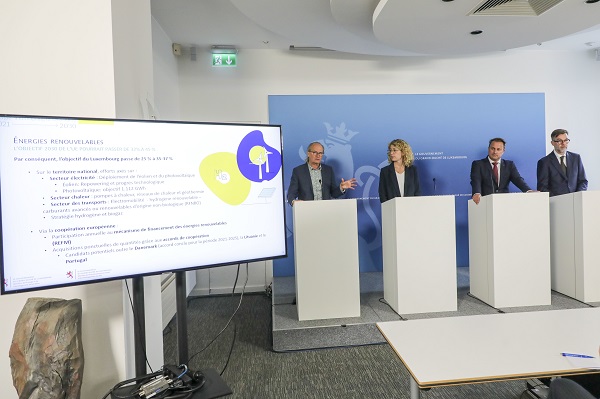 (L-R) Claude Turmes, Minister for Energy; Joëlle Welfring, Minister for the Environment, Climate and Sustainable Development; Prime Minister Xavier Bettel; Franz Fayot, Minister of the Economy;
Credit: SIP / Luc Deflorenne
(L-R) Claude Turmes, Minister for Energy; Joëlle Welfring, Minister for the Environment, Climate and Sustainable Development; Prime Minister Xavier Bettel; Franz Fayot, Minister of the Economy;
Credit: SIP / Luc Deflorenne
On Monday 17 April 2023, Luxembourg's Prime Minister Xavier Bettel, the Minister for the Environment, Climate and Sustainable Development, Joëlle Welfring, the Minister for Energy, Claude Turmes, and the Minister of the Economy, Franz Fayot, presented the first draft of the update of the "Energie- a Klimaplang fir Lëtzebuerg" (Luxembourg's energy and climate plans).
European Union (EU) member states are required to update their national energy and climate plans for 2024. A draft update must be sent to the European Commission at the end of June 2023, in advance of this deadline. As was the case when the first version of the plan was adopted, the draft update of the Luxembourg plan is once again the subject of a public inquiry, open from 17 April to 16 May 2023.
Adopted in its first version by the Government Council (Cabinet) in May 2020, the "Energie- a Klimaplang fir Lëtzebuerg" sets out climate and energy objectives by 2030, as well as the policies and measures to reach them, specifically for each of six target sectors: buildings, transport, industry, agriculture, waste and LULUCF (land use, land use change and forestry).
The government deemed the national climate targets in the 2020 version of the plan ambitious enough (and compatible with the EU (revised) targets) and thus decided against adapting these targets further. However, it acknowledged the need to strengthen renewable energy and energy efficiency targets. The targets for 2030 consist in a 55% reduction in greenhouse gas (GHG) emissions compared to 2005, an increase in the share of renewable energy of final consumption (from 25% in the previous plan to 35-37%) and a 44% improvement in energy efficiency (from a range of 40-44% in the previous plan). These ambitions and measures are also based on the results of various public consultation and institutional cooperation processes implemented in recent years.
The draft update of the "Energie- a Klimaplang fir Lëtzebuerg" lists a total of 197 different measures. These correspond to different types of instruments, are at different stages of completion, have different deadlines for their implementation and identify different entities responsible for said implementation. The following measures were identified and noted as the most important or innovative compared to the previous version of the plan:
• the CO2 tax, which will continue to increase annually by €5/t CO2, with the goal of reducing emissions from the sale of fuels for road transport;
• the continuous development of "Klimapakt 2.0" (climate pact 2.0), which encourages and supports municipalities in strengthening their role in climate action and energy transition;
• the phase-out of fossil fuel heating, in a first step through a voluntary approach, with the support of financial aid and collective solutions. If the voluntary approach proves to be too slow or insufficient, only the replacement of heating installations operated with a minimum of 70% renewable energy will be allowed;
• the creation of a national entity to support energy renovation of all low energy performing residential buildings, with the objective of providing structured and comprehensive support to owners of low energy performing residential buildings;
• a simplified procedure for accessing "Klimabonus" (climate bonus) support. The option of pre-financing mechanisms will also be explored;
• the promotion of the electrification of Luxembourg-registered vehicles. A working group dedicated to the logistics sector will establish a decarbonisation strategy for the sector;
• the introduction of a social leasing system for electric cars, implemented by means of long-term lease contracts to support low-income households in electrifying their individual mobility;
• the launch of the "Klimapakt fir Betriber" (KPB), a new tool to support small and medium-sized enterprises (SMEs) in the energy transition and climate action;
• the plan supports the national hydrogen strategy, which was presented in 2021 and is in line, according to the ministers, with the 2050 decarbonisation and climate neutrality targets;
• an accelerated roll-out of the agriculture council and a promotion of agrivoltaics;
• in forestry, the raising of targets for net greenhouse gas removals and the introduction of the "Klimabonus Bësch" aid scheme.
Finally, the ministers emphasised that, in addition to the consultations conducted prior to the updating work, this draft update of the "Energie- a Klimaplang fir Lëtzebuerg" is the result of a collaborative approach between the ministries and administrations concerned, coordinated by the Ministry of the Environment, Climate and Sustainable Development and the Ministry of Energy and Spatial Planning.
 (L-R) Claude Turmes, Minister for Energy; Joëlle Welfring, Minister for the Environment, Climate and Sustainable Development; Prime Minister Xavier Bettel; Franz Fayot, Minister of the Economy;
Credit: SIP / Luc Deflorenne
(L-R) Claude Turmes, Minister for Energy; Joëlle Welfring, Minister for the Environment, Climate and Sustainable Development; Prime Minister Xavier Bettel; Franz Fayot, Minister of the Economy;
Credit: SIP / Luc Deflorenne
 (L-R) Claude Turmes, Minister for Energy; Joëlle Welfring, Minister for the Environment, Climate and Sustainable Development; Prime Minister Xavier Bettel; Franz Fayot, Minister of the Economy;
Credit: SIP / Luc Deflorenne
(L-R) Claude Turmes, Minister for Energy; Joëlle Welfring, Minister for the Environment, Climate and Sustainable Development; Prime Minister Xavier Bettel; Franz Fayot, Minister of the Economy;
Credit: SIP / Luc Deflorenne








